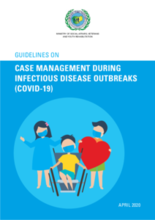Introduction
COVID-19 can disrupt the environments in which children grow and develop. Disruptions to families, friendships, daily routines and the wider community can have negative consequences for children’s well-being, development and protection. Measures used to prevent and control the spread of COVID-19, including quarantine measures such as school closures and restrictions on movements disrupt children's routine and social support while also placing new stressors on parents and caregivers who may have to find new childcare options or forgo work. With added stress, school closures and restricted movement, children and caregivers may face increased social isolation, psychosocial distress and heightened domestic violence. Movement restrictions can also make it much harder for a children or caregivers affected by violence to leave their household and seek help. In addition, stigma and discrimination related to COVID-19 may make children more vulnerable to violence and psychosocial distress. Children and families who are already vulnerable due to socio-economic exclusion, have a history of violence in the home, or those who living in overcrowded settings are particularly at risk. For all of these reasons, the continuation of case management to very high-risk children and families is a fundamental part of emergency response and should be considered child lifesaving.
All children, wherever they live and whatever their circumstances, have the right to be protected, nurtured and free from all forms of violence, abuse, neglect, maltreatment and exploitation as set out in the Convention on the Rights of the Child. Respecting and supporting this right is the essence of child safeguarding. All forms of Sexual Exploitation and Abuse (SEA) are a violation of human rights.
In line with Ministry of Social Affairs, Veterans and Youth Rehabilitation (MoSVY) Instruction No.031, dated 20 March 2020 and Instruction, dated 26 March 2020 on Prevention and Protection of COVID-19 Infection to Children without family, relative or guardian specifically on social work and psychosocial supports for children and families affected by COVID-19, this Guideline aims to further provide technical guidance to child protection workers to better respond to the child protection risks during a COVID-19 pandemic through case management, including psychosocial support.

